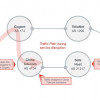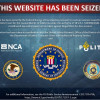Airports to ditch WLANs in favour of security
Security fears could put paid to vendors' dreams of public wireless LANS at airports. The idea of implementing wireless Internet access and ticketing systems at airports could fall by the wayside as airlines examine technology to improve security following the World Trade Center disaster.
Bluetooth and WLAN vendors had expected usage in airports to be one of the major drivers in this sector. Cash-strapped carriers, however, are unlikely to spend money to implement wireless Internet access points -- using 802.11b or Buetooth - in business class or first class lounges, when dollars could instead go towards biometrics equipment to tighten up check-in procedures or other security black spots. The same is likely to apply to wireless ticketing schemes.
Analysts and industry commentators have already said that biometrics -- fingerprint and facial recognition -- may help toughen up security at US airports. One airport security analyst ComputerWire spoke to last week, however, cautioned against expecting biometrics to be a security panacea, as the technology needs to operate faster to process the volumes of people checking in at airports and human operator error is still a factor.
This is, however, unlikely to slow the push for biometric technology in airports. It means more investment in the technology from airlines and probably the Federal Aviation Administration.
Worries about the insecurity of 802.11b and Bluetooth, either real or imagined, could be an extra reason for airports to baulk at installing wireless ticketing systems, fearing that they could be easily hacked. Certainly, 802.11b wireless LAN technology, in its current specification, is vulnerable to so-called "drive-by" hacking via a simple laptop and wireless card set-up, as several research projects have shown. In this state of heightened security awareness, airports are unlikely to want to install systems that are known to be vulnerable.
The security of Bluetooth, probably the most likely candidate for wireless ticketing via cellphones and handsets, is less well understood. This is simply because there have been very few large-scale implementations of the short-range technology. Unlike 802.11b, which has been used for enterprise wireless networking and some public access projects, the security features of Bluetooth have not really been put to the test.
Some wireless security experts have told ComputerWire that the baseline specification of Bluetooth is better protected against over-the-air hacking than 802.11b. Nevertheless, both technologies operate over the 2.4GHz public bandwidth and undoubtedly some of the lessons that hackers and researchers have learnt by breaking into the WLAN technology could be applied to Bluetooth. No technology is invulnerable.
In any case, wireless technology will not be high on agenda as the struggling airlines search for ways to convince customers that it is once again safe for them to fly.









































































